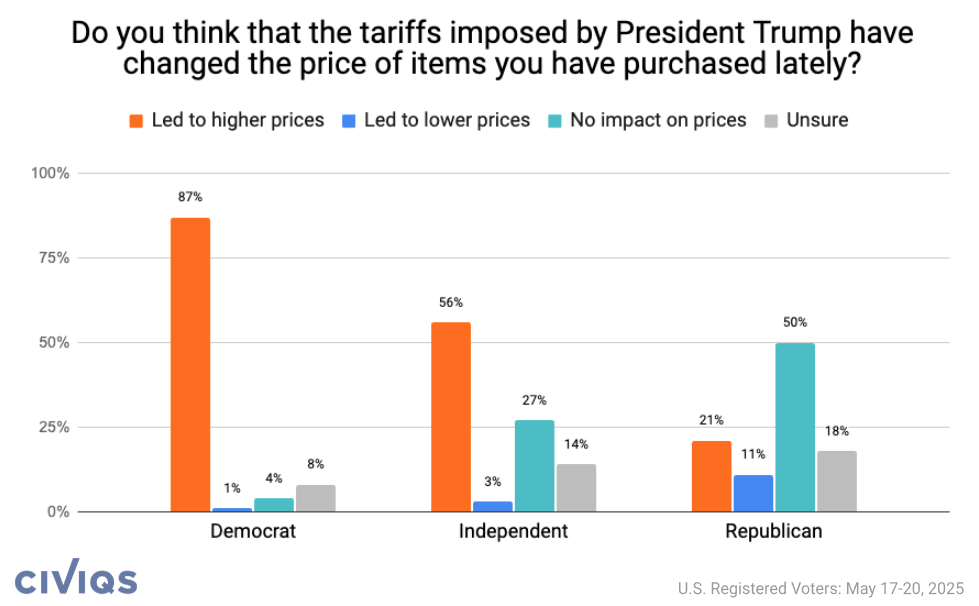Report: Americans Remain Opposed to Tariffs and Medicaid Cuts
The May 2025 Daily Kos/Civiqs Poll asked 1,018 registered voters in the United States about their opinions of President Trump, tariffs and trade policy, and support for various critical government programs.
President Trump and Trade Policy
Americans remain divided over President Trump's job performance, with 47% approving and 52% disapproving of how Trump is handling his job as president. By the same proportion, Americans oppose the way the Trump administration is handling immigration enforcement and deportations, with 47% approving and 52% disapproving.
President Trump's tariff policies also face opposition. Only 43% of voters support the tariffs that President Trump is placing on imports from other countries, with 53% opposed, including 48% strongly opposing these measures. Already, Americans are reporting that they think the tariffs have led to higher prices for recently purchased items: 56% believe the tariffs have raised prices, while 5% believe tariffs have lowered prices, and 27% say the tariffs have had no impact.

Americans are unconvinced that Trump’s tariffs will bring manufacturing jobs back to the United States. Half (49%) think the tariffs will not bring manufacturing jobs back to the U.S., compared to 43% who think they will.
Voters are evenly split (46% respectively) on which is more important: bringing manufacturing jobs back to the United States or keeping prices low. Democrats and Republicans have very different priorities. Most Democrats (77%) think keeping prices low is more important, while 81% of Republicans prioritize bringing manufacturing jobs back.
When presented with a scenario where tariffs both increase manufacturing jobs and raise prices, 36% of Americans would consider this a bad outcome (including 63% of Democrats), 33% would see it as positive (including 59% of Republicans), and 23% are neutral.
Presidential Ethics
A majority of voters (55%) believe it is unethical for President Trump to accept an airplane worth $400 million from Qatar's royal family as a temporary replacement for Air Force One. Only 19% consider this ethical, while 22% do not view it as an ethical issue. Views are strongly partisan, with 92% of Democrats considering it unethical compared to only 15% of Republicans. Among Republicans, 41% say that accepting the plane would be ethical, but 38% believe that the question is not an ethical issue.
Similarly, 56% of Americans believe it is unethical for Trump to offer a private dinner to individuals who spend the most money on his cryptocurrency. Only 16% consider this ethical, including 34% of Republicans. Another 21% of voters overall, and 37% of Republicans, believe this is not an ethical issue.
Civil Rights and Government Programs
An overwhelming 85% of Americans support the Civil Rights Act of 1964, including 72% who strongly support it. Support for this landmark legislation crosses partisan lines, with 91% of Democrats and 51% of Republicans strongly supporting it. Overall, just 10% of voters oppose the Civil Rights Act.
A majority of voters oppose cuts to key government programs. When asked about reducing funding for Medicaid programs that provide health insurance for low-income Americans, 67% oppose cuts (56% strongly and 11% somewhat).
Food safety is also a priority for Americans, with 84% opposing the elimination of routine food safety inspections by the Food and Drug Administration (FDA). Voters feel strongly about this issue: 67% strongly oppose ending the FDA’s food inspections, with 17% somewhat opposed. Only 9% support ending these inspections.
Public broadcasting receives considerable support, with 54% opposing the elimination of government funding for networks like NPR, PBS, and PBS Kids. However, 44% support cutting this funding, reflecting a partisan divide: 94% of Democrats oppose cuts while 86% of Republicans support eliminating funding. Notably, men and women diverge significantly in their opinions on government funding for public broadcasting: women oppose the elimination of funding by a margin of 26 percentage points, while men support eliminating funding by a margin of 14 percentage points.
The Energy Star program, which establishes efficiency standards for household appliances, garners support with 55% opposing the elimination of the program. However, opinion is more divided than on some of the other government programs, with 20% strongly supporting and 14% somewhat supporting the elimination of the program's funding.
A large majority of Americans (71%) believe that air travel has become less safe compared to five years ago (37% much less safe, 34% somewhat less safe). Only 13% think air travel has become safer. When asked about responsibility for recent air traffic control problems, 39% of voters blame the Trump administration, 35% blame the Biden administration, and 14% think neither are more responsible.
Civiqs surveyed 1,018 registered voters in the United States from May 17-20, 2025. The survey was conducted online, among selected members of the Civiqs research panel. Sampled individuals were emailed by Civiqs and responded using a personalized link to the survey at civiqs.com. The survey results are weighted by age, race, gender, education, party identification, and region to be representative of the population of registered voters in the United States. The general design effect due to weighting is 1.10. The survey has a margin of error of ±3.2% at the 95% confidence level, accounting for the design effect.
Download the survey methodology and crosstabs
Interested in conducting a survey? Speak with a Civiqs Analyst.
Want Civiqs updates in your inbox? Sign up for our newsletter, Immediate Reaction.